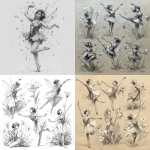Explore the Best AI Image Gallery

The AI Canvas: How Generative Images Are Reshaping Marketing
The marketing landscape is undergoing a seismic shift, driven by the emergence of artificial intelligence (AI) and its ability to generate stunningly realistic images. Generative AI models, trained on massive datasets of existing imagery, can now create unique visuals tailored to specific needs, from product mockups and social media graphics to captivating advertisements and personalized marketing materials.
A New Era for Creative Expression
For marketers, AI image generation presents a game-changing opportunity. It empowers brands to:
- Produce High-Quality Visuals at Scale: Generate numerous variations of images quickly and efficiently, saving time and resources compared to traditional design methods.
- Personalize Marketing Campaigns: Create bespoke visuals that resonate with individual customer preferences, demographics, or purchase history, leading to more effective targeting.
- Experiment with Innovative Concepts: Explore new visual ideas and aesthetics effortlessly, pushing creative boundaries and staying ahead of trends.
- Reduce Costs and Increase Efficiency: Streamline the design process by automating repetitive tasks and freeing up designers to focus on higher-level creative challenges.
Beyond Aesthetics: AI for Marketing Applications
The potential applications of AI-generated images extend far beyond aesthetic enhancements. They can:
- Enhance Product Visualization: Generate realistic 3D models and product demos, allowing customers to interact with products virtually before making a purchase.
- Create Interactive Content: Develop engaging marketing materials that respond to user input or change based on specific actions, fostering deeper customer engagement.
- Generate Personalized User Experiences: Tailor website layouts, product recommendations, and marketing messages based on individual user preferences, creating a more personalized and relevant experience.
- Automate Marketing Collateral: Generate social media posts, email banners, and other marketing assets automatically, saving time and ensuring consistent brand messaging.
Navigating the Ethical Landscape
While AI-generated images offer immense potential, it is crucial to address the ethical considerations associated with their use:
- Copyright and Intellectual Property: Establish clear guidelines for ownership and usage rights of AI-generated content to prevent infringement and plagiarism.
- Bias and Representation: Ensure that training datasets are diverse and representative to avoid perpetuating harmful biases in generated images.
- Transparency and Disclosure: Clearly communicate the use of AI-generated images to consumers, fostering trust and transparency.
- Responsible Innovation: Promote ethical development and deployment of AI technologies, considering the broader societal impact.
The Future of Marketing: A Collaborative Canvas
As AI technology continues to evolve, we can expect even more sophisticated and versatile applications in marketing. The future likely holds:
- Hyper-Personalized Experiences: AI will enable the creation of truly individualized marketing campaigns that cater to each customers unique needs and preferences.
- Immersive Visual Storytelling: Marketers will leverage AI to generate interactive and immersive visual experiences, captivating audiences and driving engagement.
- Real-Time Content Adaptation: AI algorithms will analyze consumer behavior and dynamically adjust marketing content in real-time, optimizing for maximum impact.
The convergence of AI and marketing is ushering in a new era of creativity and innovation. By embracing these advancements responsibly, marketers can unlock unprecedented opportunities to connect with their audiences, tell compelling stories, and drive business growth.






















](https://images.ai-img.art/thumbnails/150/cf8299cc184c859eff89d17514689e19c7994ad29256a58ad77fa0f7218e2cff.webp)




](https://images.ai-img.art/thumbnails/150/78b567a3483191dd52f3d16038b5a926e03e4066d5b301cfff023fb91a962e67.webp)

](https://images.ai-img.art/thumbnails/150/da89993919887fcf2c84af5ec12f2ac997ad0f67c8bf00fecd67ba06a1b3dc49.webp)

](https://images.ai-img.art/thumbnails/150/aed4d771a0a5b63bed28f6e7183dd4614c5e3e3586d300c8d879ccbb37dbfb4e.webp)
](https://images.ai-img.art/thumbnails/150/476665d1452e44d38d5b4fbf5fab4389a6131d55b7bfe8a41d7f65f66b5a9310.webp)
















](https://images.ai-img.art/thumbnails/150/915b5e50ce61f6219cb8f764d89e2efcb8ad3a9ebd09e0670ae7dc0e2c99a8bd.webp)